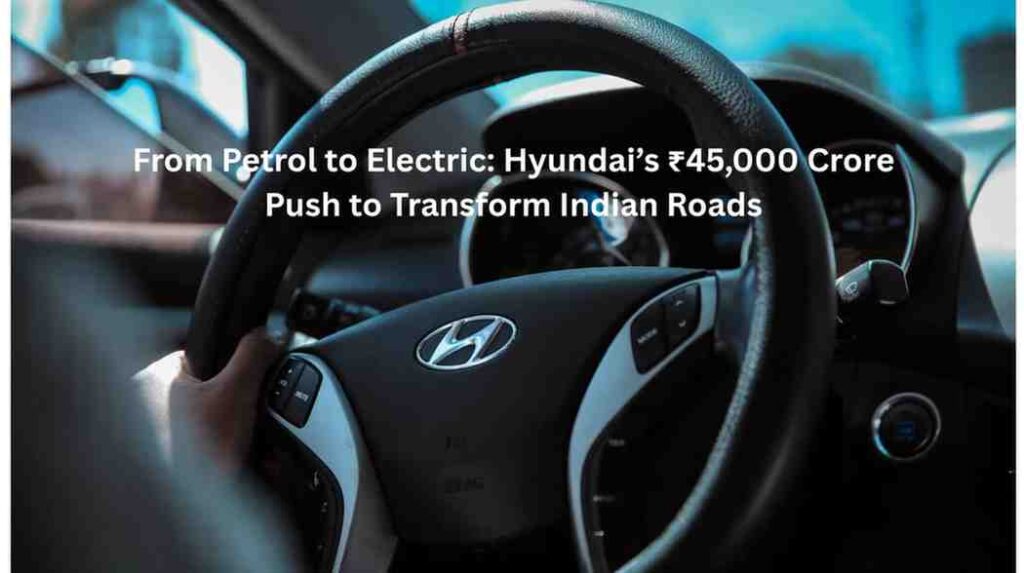Hyundai Bets Big on India: ₹45,000 Crore Investment, 26 New Cars Coming by 2030

Hyundai Motor Company is making a massive bet on India, unveiling plans to invest ₹45,000 crore in the country by FY2030. The South Korean auto giant aims to launch 26 new vehicles over the next seven years, covering everything from electric SUVs and hybrids to advanced mobility solutions tailored for Indian customers.
The announcement underscores India’s growing role in Hyundai’s global strategy. It also coincides with the appointment of Tarun Garg as the first Indian Managing Director & CEO of Hyundai Motor India Ltd (HMIL), emphasizing the company’s commitment to local leadership and long-term growth in the Indian market.
Hyundai’s 2030 Vision: More Than Just Cars
During its first-ever Investor Day in India, Hyundai Motor Co. President & CEO Jose Munoz outlined an ambitious roadmap. One key highlight is Hyundai Capital, the company’s financial services arm, which will debut in India by mid-2026. This move aims to simplify financing for customers and boost overall vehicle sales.
Luxury enthusiasts will also have something to look forward to: Genesis, Hyundai’s premium brand, is set to enter India by 2027 with local assembly—a first for the country’s high-end auto segment.
On the product front, HMIL plans to introduce 26 new vehicles by FY2030, including seven entirely new nameplates. These will range from MPVs and rugged SUVs to next-gen hybrid models, ensuring Hyundai has options for every type of Indian driver.
A “Made in India” Electric Future
One of the most exciting aspects of Hyundai’s plan is the launch of a fully designed and locally manufactured electric SUV by 2027. This vehicle, developed specifically for India, could also be exported to global markets, showcasing India’s growing importance in Hyundai’s EV strategy.
Munoz highlighted India’s potential as a global hub for EV production, leveraging local engineering talent, supply chain efficiencies, and cost advantages. Hyundai targets up to 30% of its exports to come from India in the coming years.
Investment Breakdown and Growth Goals
Of the ₹45,000 crore, 60% will be dedicated to product development and R&D, while the remaining 40% will expand manufacturing capacity and upgrade facilities. Hyundai’s goal is not just to increase sales, but to establish India as a center for innovation and automotive excellence.
HMIL is targeting ₹1 lakh crore in revenue by FY2030, a 1.5x increase from current levels. The company also plans to maintain double-digit EBITDA margins and ensure sustainable shareholder returns, with a 20–40% dividend payout.
Expanding Reach Across India
According to Tarun Garg, Hyundai India is focusing heavily on the SUV segment, projecting that 80% of total sales will come from utility vehicles by 2030. The company also plans to have over 50% of its portfolio powered by eco-friendly technologies, including CNG, hybrid, and electric vehicles.
Hyundai is looking beyond big cities. By FY2030, it aims to have a sales and service network covering 85% of Indian districts, with rural and semi-urban markets contributing nearly 30% of overall sales. This push is expected to significantly strengthen Hyundai’s presence in emerging markets across India.
Leadership with a Vision
The appointment of Tarun Garg as MD & CEO reflects Hyundai’s evolving strategy in India. While the brand has long been viewed as a foreign company with Indian roots, it is now positioning itself as an Indian brand with global ambitions.
Munoz captured the company’s mindset succinctly:
“While others cut, we build. While others exit markets, we double down.”
This approach sharply contrasts with companies like Ford and General Motors, which recently exited India, highlighting Hyundai’s confidence in the country’s long-term growth potential.
What It Means for India
Hyundai’s ₹45,000 crore investment goes far beyond cars. It promises thousands of jobs, advanced technology, and innovation, while positioning India as a key player in the global EV value chain. The move is a vote of confidence in India’s manufacturing capabilities and a significant boost to the nation’s automotive ecosystem.
By 2030, India’s automotive landscape is set for a transformation. Roads could soon be filled with locally-made electric SUVs, hybrid sedans, and tech-driven vehicles, all carrying Hyundai’s badge. This isn’t just an investment in cars—it’s an investment in India’s automotive future.



